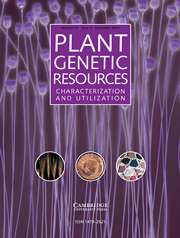Article contents
Detection of polymorphic simple-sequence repeat markers that show linkage to a novel sugarcane brown rust disease resistance gene in resistant and susceptible genetic pools
Published online by Cambridge University Press: 12 November 2020
Abstract
Sugarcane brown rust, caused by Puccinia melanocephala, is one of the main diseases of sugarcane in China. The identification and discovery of new resistance genes have important theoretical and practical significance for preventing outbreaks of brown rust and ensuring the sustainable production of sugarcane. To screen for polymorphic simple-sequence repeat (SSR) molecular markers for localization of brown rust resistance genes, we used two populations that are suitable for genetic linkage map construction and mapping of new resistance genes to construct resistant and susceptible genetic pools. We then screened 449 pairs of primers to identify polymorphic SSR markers in the parental lines and the resistant/susceptible genetic pools. The results showed that 25 pairs of primers directed amplification of polymorphic DNA fragments between the parents of the cross combination ‘Yuetang 03-393’ × ‘ROC 24’, and 16 pairs of primers amplified polymorphic fragments between the parents of the cross combination ‘Liucheng 03-1137’ × ‘Dezhe 93-88’. Four pairs of primers (SMC236CG, SCESSR0928, SCESSR0636 and SCESSR2551) amplified polymorphic DNA fragments between the parental lines and the resistant/susceptible genetic pools in ‘Yuetang 03-393’ × ‘ROC 24’. The results of this study will establish a solid foundation for the mapping of new brown rust resistance genes, genetic linkage map construction and the development of closely-associated molecular markers in sugarcane.
Information
- Type
- Research Article
- Information
- Copyright
- Copyright © The Author(s), 2020. Published by Cambridge University Press on behalf of NIAB
Footnotes
These authors contributed equally to this study.
References
- 1
- Cited by

